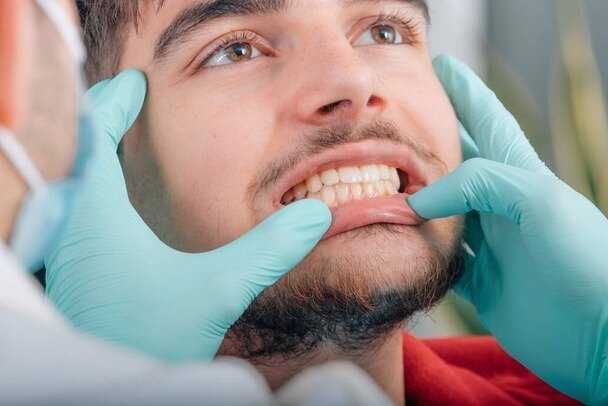Dental implants can be a great way to restore your smile, but can food get stuck in them?
In this article, we will explore the reality of food getting stuck in dental implants, and the reasons why that can happen.
We will also discuss how dental implants can affect eating, as well as share tips on how to prevent food from getting stuck in Melbourne dental implants.
The Reality Of Food Getting Stuck In Dental Implants
With the rapidly increasing popularity of dental implants as a tooth replacement solution, it is not uncommon for patients to be concerned about their functionality and how they might impact their eating habits. One common concern is the possibility of food getting stuck around or underneath the implants.

Why Food Can Get Stuck In Dental Implants?
In short, yes, it is possible for food particles to occasionally get trapped in the tiny gaps around or underneath the dental implants. However, with proper care and maintenance, this should not pose a significant problem or interfere with your ability to enjoy your favourite meals.
Can Food Get Stuck In Dental Implants?
There are a few reasons why food particles may become caught in dental implants. Some of the most common causes include:
- Improper implant placement: In some cases, dental implants may be placed too close together or at an incorrect angle, which can make it easier for food to become lodged in the gaps between the implant and the surrounding teeth.
- Crowns that do not fit properly: The crown, or the artificial tooth that is placed on top of the dental implant, should be designed to fit seamlessly with your adjacent teeth. If the edges of the crown are not properly contoured, it can create pockets where food can become stuck.
- Gum recession: If the gums recede around the dental implant, they can expose the edge of the implant or the abutment, which can then lead to food particles being trapped in these areas too.
- Bone loss: In some cases, a patient may experience bone loss around the dental implant over time. This can lead to gaps or pocket formations where food particles can get stuck.
How Dental Implants Affect Eating
When dental implants are properly placed and maintained, they should provide a comfortable and ideal solution for tooth replacement, allowing you to eat comfortably and efficiently. However, some aspects of dental implants could affect your eating habits:
- Chewing: Immediately after the placement of your dental implants, you should avoid chewing on the affected side of your mouth to give the implant time to settle and integrate with your jawbone. It usually takes a few days to a week, after which you should be able to chew normally.
- Food choices: Although dental implants are designed to function like natural teeth, it is still essential to be mindful of the foods you consume, especially in the early days following the procedure. You should avoid very hard or sticky foods that could potentially damage the implant or the surrounding tissue.
- Oral hygiene: To prevent food particles from becoming stuck in your dental implants and maintain overall oral health, it is important to maintain a strict oral hygiene routine that includes brushing, flossing, and regular dental check-ups.
- Implant care: It is essential to care for your dental implants as you would your natural teeth. This includes annual check-ups with your dentist and possibly using specialised cleaning aids like interdental brushes or water flossers that are specifically designed for cleaning around dental implants.
Tips For Preventing Food Getting Stuck In Dental Implants
Implementing some simple strategies into your dental care routine can help minimise the chances of food getting stuck in your dental implants:
- Chew thoughtfully: Take your time when eating and chew your food thoroughly to ensure that nothing gets trapped in your implants.
- Rinse your mouth: Rinsing your mouth after meals can help to dislodge any potential food particles that may have become stuck around your dental implants.
- Use a water flosser: Investing in a water flosser can be an effective way to clean around dental implants, particularly in those hard-to-reach areas.
- Schedule regular dental appointments: Regular dental implant checks and cleaning can help to catch any potential implant-related issues early and ensure that your implants are functioning optimally.
Conclusion
Taking a proactive approach to care for your dental implants by following the tips and recommendations mentioned above will help reduce the risk of food getting stuck in them.
Remember, maintaining good oral hygiene and consulting with your dentist regularly are essential steps to ensure the longevity and overall success of your dental implants.